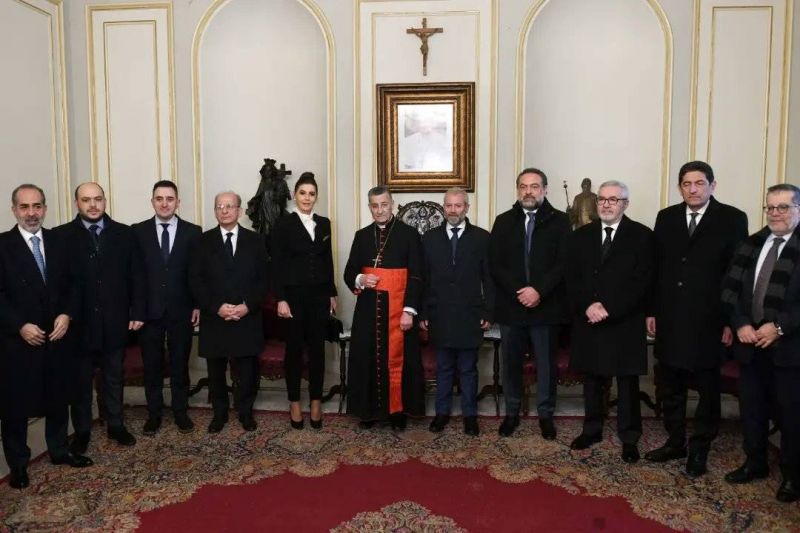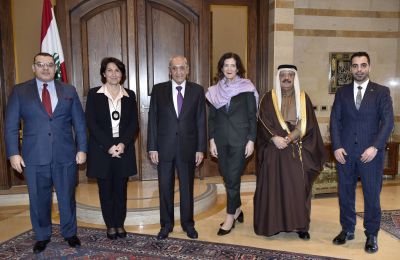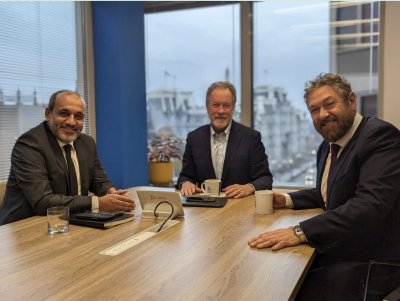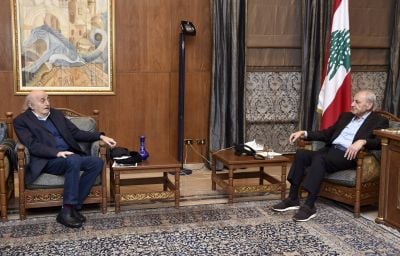
Patriarch Rai surrounded by a delegation of the Lebanese Forces in Bkirki, February 7, 2023. (Twitter)
Maronite Patriarch Bechara al-Rai continues his efforts to bring together the 64 MPs of the various Christian communities in hopes of initiating a presidential election.
During a religious summit Rai attended over two weeks ago, he was entrusted with the mission of bringing the Christian deadlock to an end.
With many Christian factions wary of Hezbollah’s endorsement of Marada leader Sleiman Frangieh, cooperation is deemed essential.
The main Christian blocs, namely the Lebanese Forces and the Free Patriotic Movement, do not support Frangieh’s candidacy for president.
Dispute among Christian leaders is slowing down Rai’s efforts as each party seeks to impose its own conditions before taking part in dialogue.
But Bkirki seems to be taking action to ensure a meeting between parties.
After the Feb. 1 religious summit, Rai instructed Maronite bishop of Antelias, Antoine Bou Najm, to organize talks with leaders of the various Christian factions to set the tone for a potential meeting, said a source close to Najm.
Najm began his tour on Thursday at the headquarters of the Free Patriotic Movement (FPM) in Sin el-Fil, where he met with party head Gebran Bassil.
According to the same source, the bishop is also expected to meet with Franigeh and presidential contender Michel Moawad.
The LF proposal
Najm is scheduled to visit Maarab, residence of Lebanese Forces (LF) leader Samir Geagea next week.
Geagea has set conditions for his participation in dialogue.
"If the alleged meeting in Bkirki is not likely to lead to concrete results, it is better not to hold it,” Geagea said.
Geagea’s comments were interpreted as a snub at Rai’s initiative. Following Geagea’s comments, Archbishop Rai met with an LF delegation.
“To ensure the success of the meeting, we proposed two solutions: to organize a sort of vote that would lead to a candidate, or to conclude an inter-Christian agreement around a figure,” Antoine Mrad, Geagea's advisor for presidential affairs, told L’Orient-Le Jour.
“This is because a possible failure of the Bkirki meeting would make the Christians responsible for blocking an election that concerns them in the first place,” said Mrad.
Accusations echoing Mrad’s comments have grown louder within Hezbollah’s circles. Hezbollah and its allies have often been accused of preventing the quorum needed for electing a president.
Accusations that the Christian factions are blocking presidential elections has prompted the patriarch to personally interfere in the matter.
“While the president is a Maronite, his voters are not all Christians and while part of the responsibility [for the deadlock] lies with the Christian leaders, great responsibility also lies with others,” Rai said on Sunday.
“The disagreements among the Christians focus on the identity of the future president, while the others disagree on the identity of the Republic,” Rai continued.
These remarks are likely directed at Hezbollah, who is accused of endorsing Iran’s agenda.
Refloat Bassil?
According to a source close to Bassil who has asked to remain anonymous, there is talk in FPM circles that the LF’s call to organize a vote under the leadership of Bkirki is “a way of imposing a president on the 64 Muslim MPs.”
“We do not have a candidate and we want to put an end to the blockage of the election. We therefore call for a dialogue that would not only focus on the person of the future president, but also on the appointment of the prime minister, the formation of the cabinet and the appointment of the next central bank governor,” continued the source.
Some observers believe that the LF’s focus is on blocking Geagea’s main rival, Gebran Bassil, whose current relations with the overwhelming majority of political actors, including his only ally Hezbollah, are in turmoil.
It is said that dialogue in Bkirki could restore the tarnished image of the FPM leader and strengthen his say in choosing a president.
“Gebran Bassil does not need to be refloated. The people voted for him in the elections in May,” an FPM source said.
This article was originally published in French in L'Orient-Le Jour. Translation by Sahar Ghoussoub.


